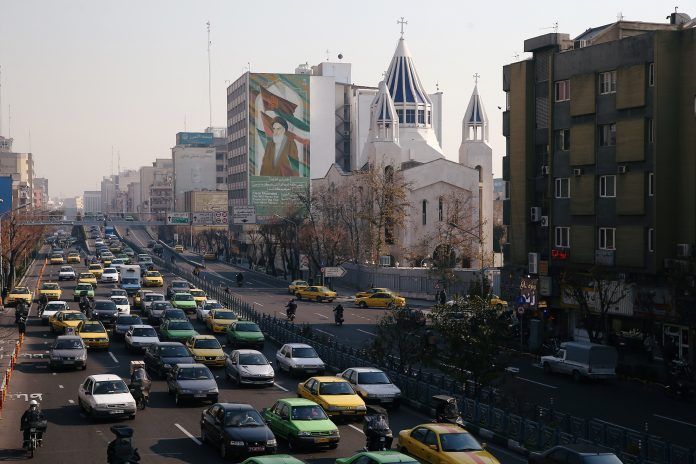
Prison terms for Christians in Iran arrested for practicing their faith increased sixfold in 2024, and one Christian man with dual nationality was allegedly taken hostage as leverage for the release of Iranians detained in the US, according to a new report published by Article 18, a London-based nonprofit that promotes freedom of religion in Iran.
There are approximately 800,000 Christians in Iran, of which 130,000 are ethnic Armenian and Assyrian Christians, and the remaining 670,000 converts from Islam. Iran’s theocracy considers Christians who have converted from Islam to be apostates, a form of religious abandonment which is a criminal offense under Iran’s law. Punishments for this offense can be severe, with judges able to impose long prison sentences, corporal punishment and the death penalty.
The Article 18 annual report, published on Jan. 20, was compiled with UK-based Christian organizations Middle East Concern (MEC), Christian Solidarity Worldwide (CSW) and Open Doors. The report’s title, “The tip of the iceberg,” references the lack of information about such arrests, as many cases are never reported. Its publication coincides with the upcoming United Nations Human Rights Council’s Universal Periodic Review (UPR) of Iran’s human rights record, to take place on Jan. 24 at the council’s headquarters in Geneva.
“Article 18 looks forward to seeing how the Islamic Republic of Iran attempts to claim that it is upholding the freedoms it blatantly denies its citizens, including to freedom of religion or belief, in its UPR review on Friday,” Steve Dew-Jones, the news director for Article 18 and a co-author of the report, said in an interview with Kayhan Life. “Christians continue to be targeted in violation of their rights under the International Covenant on Civil and Political Rights, which Iran has ratified and which in Article 18 of that covenant enshrines religious freedom – including the freedoms to change one’s beliefs and to share them with others.”
Christians in Iran Are Arrested for Practicing Faith, Charity Says
ANALYSIS: The Hostage Trade Is Central to Iran’s Foreign Policy
“It is these two elements of religious freedom that are most under threat for Christians in Iran, encompassing both the Assyrians and Armenians who wish to share their faith, and the non-Christian Iranians who seek to learn more about the faith and, in some cases, to convert,” Dew-Jones said. “Both these rights are denied, against Iran’s international obligations and therefore also against its own Civil Code, which stipulates in Article 9 that the international covenants Iran has signed are to be considered binding law.”
An estimated 96 Christians were sentenced to a combined 263 years in prison in 2024, compared with 22 Christians sentenced to almost 44 years in 2023, according to the report. Individual prison sentences were also increased. The report confirmed that five Christians received 10-year prison terms and one other Christian was handed a 15-year sentence, all on charges related to the practice of their faith. The government collected almost $800,000 dollars in fines from convicted Christians in 2024 – the highest amount to date.
One Christian, an Iranian native with US citizenship referred to as “Alexander B” and “Mr. B” in the report, was allegedly interrogated by a Ministry of Intelligence official and sentenced to five years in prison and two years of forced residence in the Southern Iran city of Kahnuj on fabricated charges.
Following a review of his files, the lawyers for Mr. B: “accused the intelligence officer of fabricating the case so that their client could be exchanged for Iranian detainees in the US. He had effectively been ‘taken hostage’ for use in a prisoner exchange.”
The report noted increased involvement in 2024 by Iran’s Islamic Revolutionary Guards Corps (IRGC) in the detection, detention and punishment of Christians. A new policy involving the targeting of Christians who received funding from abroad emerged in the second half of 2024, the report said, with Christians targeted in at least five different cities within a two-month period.
Regime Change Is Only Solution For Iran, Say DC Conference Speakers
Intelligence agents from the IRGC carried out each of these arrests, while several Christians were subjected to severe psychological pressure by guards who interrogated them. Christians arrested were most often charged under Article 500 of the Islamic Penal Code (IPC), which enables a maximum punishment of 10 years in prison in cases where the individual has received “financial or organizational help from outside the country.”
Discussing the IRGC’s increased involvement, Dew-Jones said: “One reason may be that the regime feels particularly threatened at this time and therefore has moved to use its chief custodian of Islamic ‘revolutionary’ values to cling on to power, by targeting all those groups considered a threat to the Islamic Republic, including Christians who do not toe the regime line, or as one prosecutor put it in a judgment included in our report, ‘unaligned Christians’.”
The UN has repeatedly called on Iran’s government to ends its discrimination of Christians in the country. It most recently called on Iran to end its “systematic persecution” of religious minorities, including Christians, in a 2022 press release. The UN also expressed the same concerns in its last UPR report, published in 2014. Recommendations set out in Article 18’s report included:
- the unconditional and immediate release of Christians and other religious or faith minorities “detained on charges related to their faith or religious activities;”
- access to the country for UN Special Rapporteurs to investigate Iran’s compliance with international human rights law;
- use of international law to hold the regime accountable for failing to fulfill its obligations under international law;
- inclusion of the situation of Christians and Christian converts in all reporting on human rights in the Islamic Republic of Iran.
Iran’s Minorities Disproportionately Targeted in Crackdowns, UN Mission Reports
https://kayhanlife.com/authors/irans-persecution-of-religious-minorities-is-appalling-us-state-department-says/













